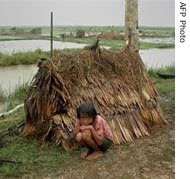Ethnic delegation urges Australia to lend more support
by Solomon
New Delhi (Mizzima) – The apex body of Burma’s ethnic nationalities, the Ethnic Nationalities Council, said it had called on Australia to send a special envoy to Burma, in order to facilitate a process of dialogue.
Delegates of the ENC, an umbrella organization of Burma’s ethnic political and armed groups, said they had urged the Australian government to designate a special envoy to put pressure on Burma’s military rulers for political reforms.
During an eleven-day lobbying trip to Australia, the Thailand-based ENC representatives, urged Australia to take a stronger stand on Burma and boycott its proposed 2010 elections, as it was a process to legitimize military rule in the country.
The representatives also explained the importance of a tripartite dialogue that would include the government, the opposition led by Aung San Suu Kyi and representatives of ethnic nationalities and urged Australia to mount pressure on the junta to kick-start a tripartite dialogue.
Duwa Mahkaw Hkunsa, General Secretary of the ENC, who is among the four-member delegation, told Mizzima that the Australian government had given a positive response to their requests of pressurizing the Burmese junta on ethnic issues, and to provide more support for the Burmese democratic movement both politically and financially.
The ENC delegation, has so far met an Australian parliamentarian, Assistance Secretary of Foreign Affairs Ministry and the Minister of Immigration and Citizenship. The delegation began their trip on February 20 and it will continue until March 3.
“They [government] agreed to our suggestions and they told us that there would be discussions later in the government meetings,” Mahkaw Hkunsa said.
He added that the main goal of the mission was to urge Australia for increased support on Burma’s movement for democracy and to highlight the need for ethnic participation in Burma’s political solution.
Mahkaw Hkunsa said the ENC would continue with its lobbying mission to Canada, Japan and the United States in order to gain more support for Burma’s democratic movement and to boycott the junta’s one-sided roadmap, including the 2010 elections.
In a statement, the ENC made a 13-point recommendation for the Australian Government to implement, in support of Burma’s democratic movement, including pressurizing the Burmese junta to release all political prisoners, to ensure ethnic nationalities’ participation in political processes, to provide financial support for democracy and humanitarian assistance to the people of Burma.
ENC said, Burma’s political problems could only be solved through a tripartite dialogue, which included the military government, ethnic representatives and opposition party led by detained Nobel Peace Laureate Aung San Suu Kyi.














